|
|
|
Sort Order |
|
|
|
Items / Page
|
|
|
|
|
|
|
| Srl | Item |
| 1 |
ID:
084002
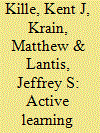

|
|
|
|
|
| Publication |
2008.
|
| Summary/Abstract |
This article reports on the results of a workshop on active teaching and learning sponsored by the Instituto de Relações Internacionais at the University of Brasilia. This 2-day, intensive workshop was designed by the authors to introduce teaching and learning strategies and to promote critical dialogue for professors and advanced students from institutions across Brazil. Details are provided on sessions that addressed the philosophy behind active teaching and learning, resources available for developing and carrying out exercises, a wide range of techniques, and the importance of debriefing and assessment. Finally, the article provides an evaluation of the workshop experience, emphasizing its potential value for training international relations instructors, both within the United States and across other international contexts, on ways to integrate active teaching and learning into their classrooms.
|
|
|
|
|
|
|
|
|
|
|
|
|
|
|
|
| 2 |
ID:
084003
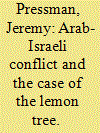

|
|
|
|
|
| Publication |
2008.
|
| Summary/Abstract |
This article uses the The Lemon Tree by Sandy Tolan (2006) to demonstrate how one type of book, a literary non-fiction book written for popular audiences, can be used in a political science course such as one on the Arab-Israeli conflict. The book concisely presents multiple Arab-Israeli perspectives and enlivens the history and infuses it with both broader and deeper meaning. After a brief summary of the plot, the article gives examples of political science themes for which the book is a useful text: nationalism and the formation of national identity; the relationship between structure and agency; and the search for objective truth. The book also suggests many broad Arab-Israeli motifs. The article explains how the book was used in the classroom, including discussions, guidance sheets, and a longer paper assignment.
|
|
|
|
|
|
|
|
|
|
|
|
|
|
|
|
| 3 |
ID:
084004
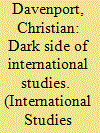

|
|
|
| 4 |
ID:
084012
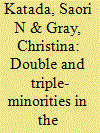

|
|
|
|
|
| Publication |
2008.
|
| Summary/Abstract |
When a female minority professor struggles to establish authority in the classroom, the first question that comes to her mind is, "Is it me?" By surveying more than a dozen female minority professors, we reach the conclusion that those professors face a unique position and particularly demanding tasks in universities as they face challenges of systemic institutional and social underpinning of universities.
|
|
|
|
|
|
|
|
|
|
|
|
|
|
|
|
| 5 |
ID:
084007


|
|
|
| 6 |
ID:
084000
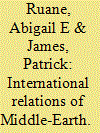

|
|
|
|
|
| Publication |
2008.
|
| Summary/Abstract |
This article demonstrates how by using J.R.R. Tolkien's Lord of the Rings (LOTR) as a text in the classroom instructors can relay the international relations (IR) "Great Debates" and feminist "waves" to students through the framework of "where you stand depends on where you sit." It overviews how J.R.R. Tolkien's acclaimed trilogy is relevant to learning about IR and then presents a number of "cuts" into using LOTR to inform IR teaching of both problem solving and critical theory. It begins by parsing the three "Great Debates" of IR theory and three "waves" of feminist theory in terms of different worldviews by relating them to characters from the trilogy. Next, the paper suggests that a critical evaluation of this analysis conveys that concerns, goals, and understandings of problems and insecurities are influenced (although not determined) by context, such as gender, race, class, sexuality, and postcolonial position. It concludes by suggesting that further use of popular culture and the humanities can help IR teaching both illustrate and critically reflect on IR scholarship.
|
|
|
|
|
|
|
|
|
|
|
|
|
|
|
|
| 7 |
ID:
084005
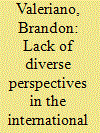

|
|
|
|
|
| Publication |
2008.
|
| Summary/Abstract |
What does it feel like to be alone intellectually? The perspectives of minorities in the International Relations field are often ignored and disrespected. This article discusses the viewpoints minorities can add to the field and how their perspectives can aid research and theory development. The challenges and intellectual hardships of those from the underrepresented classes are difficult to understand and this article provides an overview for such concerns.
|
|
|
|
|
|
|
|
|
|
|
|
|
|
|
|
| 8 |
ID:
084009
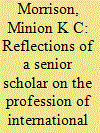

|
|
|
|
|
| Publication |
2008.
|
| Summary/Abstract |
This article discusses the paucity of representation of African Americans in the discipline and the relative absence of research on racial politics.
|
|
|
|
|
|
|
|
|
|
|
|
|
|
|
|
| 9 |
ID:
083999


|
|
|
|
|
| Publication |
2008.
|
| Summary/Abstract |
This project is an integrated quantitative and qualitative examination of the influences on U.S. foreign policy toward a sample of Middle East states (Israel, Iraq, and Saudi Arabia) over the last quarter century. Examinations of general trends in the relationships between these dyads, regression analyses, and brief case studies look at a number of factors contributing to the construction of these relationships, what these relationships look like, and how they have changed over time. The findings show that both policy reciprocation and U.S. executive play key roles in determining U.S. foreign policy outcomes. Also discussed is the utility of a broad-based research approach including the integration of qualitative and quantitative work, the examination of individual-level, state-level, and structure-level influences in an inclusive framework, as well as the taking interactive trends over time and the various degrees of conflict within these trends ("high,""low," and "middle") into account
|
|
|
|
|
|
|
|
|
|
|
|
|
|
|
|
| 10 |
ID:
084001
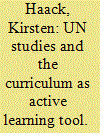

|
|
|
|
|
| Publication |
2008.
|
| Summary/Abstract |
Active learning as a means to achieve qualitative, that is "deep," learning has become an accepted form of learning and teaching in higher education. The subject of UN studies has been at the forefront of active learning since the introduction of Model United Nations in the early twentieth century. However, the fact that active learning has become "fashionable" raises the question of whether its application continues to achieve its intentions and therefore its full potential. This article questions the promise of active learning in UN studies by analyzing the way in which students learn about the UN, be that in Model United Nations simulations or in the classroom. It demonstrates how conventions of UN teaching (and research) obstruct the achievement of true deep learning and develops principles for a new curriculum that acts as active learning tool, that is, one that supports students understanding of the subject. These principles are developed into outlines of "best practice" curricula.
|
|
|
|
|
|
|
|
|
|
|
|
|
|
|
|
|
|
|
|
|